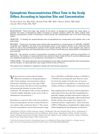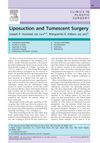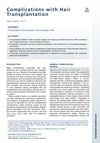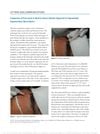 4 citations,
July 2016 in “Dermatologic Surgery”
4 citations,
July 2016 in “Dermatologic Surgery” Higher epinephrine concentration and specific injection sites increase scalp vasoconstriction time.

Combining epinephrine with a steroid may help regrow hair in severe alopecia areata cases.
 September 2017 in “Springer eBooks”
September 2017 in “Springer eBooks” Epinephrine does not significantly affect the severity of hair loss after surgery.
May 2022 in “Endocrine Abstracts” Finasteride may cause sexual dysfunction by reducing epinephrine levels.
 May 2021 in “Clinical Endoscopy”
May 2021 in “Clinical Endoscopy” Platelet-rich plasma treatment is more effective and cost-efficient than epinephrine for healing bleeding peptic ulcers, with fewer complications and rebleeding cases.
 20 citations,
January 2006 in “Clinics in Plastic Surgery”
20 citations,
January 2006 in “Clinics in Plastic Surgery” Tumescent liposuction is safe and effective for different cosmetic surgeries if done within recommended limits.
 16 citations,
May 1998 in “International Journal of Dermatology”
16 citations,
May 1998 in “International Journal of Dermatology” Stress hormones like cortisol may trigger psoriasis flare-ups.
 12 citations,
April 2020 in “Facial Plastic Surgery Clinics of North America”
12 citations,
April 2020 in “Facial Plastic Surgery Clinics of North America” Hair transplant complications are rare with good planning and technique, but risks include infection, bleeding, and patient dissatisfaction.
 4 citations,
January 2012 in “Elsevier eBooks”
4 citations,
January 2012 in “Elsevier eBooks” The document concludes that various skin conditions have specific treatments, ranging from antihistamines for urticaria to surgery and medication for tumors and chronic skin diseases.
 4 citations,
March 2002 in “Hair transplant forum international”
4 citations,
March 2002 in “Hair transplant forum international” Using tumescent anesthesia in hair restoration surgery is safe and effective for long-lasting scalp numbness and reducing bleeding.
 1 citations,
August 2023 in “Andrology”
1 citations,
August 2023 in “Andrology” Finasteride changes hormone levels and certain proteins in rats, but these effects can be reversed after stopping the drug.
 July 2020 in “Hair transplant forum international”
July 2020 in “Hair transplant forum international” Nitroglycerin can stop scalp necrosis during hair transplant surgery.

Scalp cooling is recommended to prevent chemotherapy-induced hair loss, but no effective drugs are available.
 May 2013 in “Hair transplant forum international”
May 2013 in “Hair transplant forum international” A man had hiccups for several days after a hair transplant, likely due to medication or nerve irritation, but they stopped on their own.
 March 2000 in “Aesthetic Surgery Journal”
March 2000 in “Aesthetic Surgery Journal” Hair transplantation techniques have improved and are beneficial for aesthetic surgery practices.
 25 citations,
June 2020 in “Dermatology practical & conceptual”
25 citations,
June 2020 in “Dermatology practical & conceptual” Scalp cooling can help prevent hair loss from chemotherapy, but treatment should be tailored to the individual and more research is needed.
 11 citations,
October 2011 in “Allergologia et immunopathologia”
11 citations,
October 2011 in “Allergologia et immunopathologia” A girl with Netherton syndrome was able to eat wheat without allergies after a special treatment.
 9 citations,
September 2015 in “Medical Clinics of North America”
9 citations,
September 2015 in “Medical Clinics of North America” The document explains how to do skin procedures, care after surgery, and when to use certain treatments.
 May 2024 in “The journal of sexual medicine”
May 2024 in “The journal of sexual medicine” Finasteride treatment may cause erectile dysfunction, but stopping it reverses these effects.
1 citations,
July 2022 in “Journal of Cataract and Refractive Surgery” Certain medications and conditions increase the risk of intraoperative floppy-iris syndrome.
 September 2018 in “Plastic and reconstructive surgery. Global open”
September 2018 in “Plastic and reconstructive surgery. Global open” A new earlobe repair method using cartilage grafts showed high satisfaction and no re-splitting.
January 2022 in “Essentials in ophthalmology” Tamsulosin increases the risk of floppy iris syndrome during cataract surgery.
 38 citations,
January 2014 in “International Journal of Endocrinology”
38 citations,
January 2014 in “International Journal of Endocrinology” Adrenal disorders can cause lasting brain and behavior issues in children.
 3 citations,
January 2021 in “Skin appendage disorders”
3 citations,
January 2021 in “Skin appendage disorders” Hair loss can occur about 4 weeks after scalp surgery but usually grows back within 3 months without treatment.
 2 citations,
April 2018 in “Journal of Cosmetic Dermatology”
2 citations,
April 2018 in “Journal of Cosmetic Dermatology” Tumescent fluid increases scalp hair angles, which may improve hair transplant results and reduce surgeon fatigue.
 1 citations,
September 2017 in “Dermatologic Surgery”
1 citations,
September 2017 in “Dermatologic Surgery” The cephalic approach for nerve blocks is less painful than the anterior approach during hair restoration surgery.

Follicular unit extraction is safe and effective without bupivacaine and nerve blocks when using lignocaine with adrenaline.
 393 citations,
November 2000 in “Archives of General Psychiatry”
393 citations,
November 2000 in “Archives of General Psychiatry” Testosterone is important for men's sexual function, may help some women's sexual desire, while other hormones and neurotransmitters also play complex roles in sexual behavior.
 22 citations,
March 2018 in “International Ophthalmology”
22 citations,
March 2018 in “International Ophthalmology” Taking tamsulosin or finasteride and being older increase the risk of floppy iris during cataract surgery.
 5 citations,
April 2002 in “The American Journal of Medicine”
5 citations,
April 2002 in “The American Journal of Medicine” Hair loss can be an early sign of HIV infection.



























